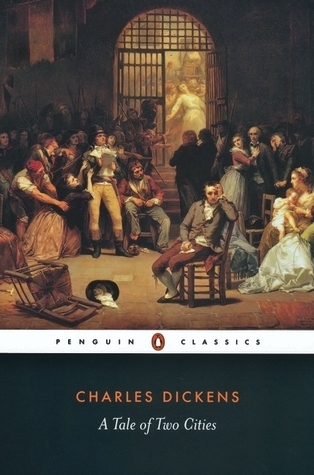
A Tale of Two Cities is one of those classics perpetually haunting you for not having read it, so I finally did that, and have to report the dubious achievement of never having been spoiled about anything except for its opening line despite its fame. Yes, reader, I was not even aware the book was about the bloody French Revolution.
The book starts with a carriage rolling towards Paris, where a bank manager meets a young lady for the first time to tell her that her father did not in fact die before she was born, but was imprisoned for most of his life for an unnamed reason, and now requires her lifelong care. It was clearly a time of greater trust in strangers and belief in the sanctity of the blood bond, because she acquiesces and returns to England with a father.
We are then at a trial where a man, Darnay, is denounced for being a spy on the most circumstantial of evidence, leaving you in perplexity they even bothered to have trials. The penalty is death, but fortunately he gets acquitted after his lawyer points out to the witness that the man he saw could have been any other, eg the lawyer’s colleague, after which the jury gasps because they look absurdly alike and lets Darnay go due to confusion.
After that we find out that Darnay is actually the nephew of rich cruel French man who enjoys running over peasant babies with his carriage. Darnay rejects that background and his inheritance, and instead chooses to go to England and dirty his hands by working, horror of horrors.
Darnay marries the young lady and has a little baby, but decides to go back to Paris at the start of the French Revolution thinking he’d swoop in and save his family servant who cried help, the peasants want my head for being your family’s rent collector. To no one’s surprise, he gets imprisoned without trial.
The later half of the book has the family trying their utmost to save Darnay, and along the way we find out how Darnay’s fate has actually intertwined with the young lady’s father as well as the revolution’s ringleader before he was even capable of choice. The revolution is a sombre blood fest, and the book ends with a heroic action of the most selfless nature, elegantly coming full circle.
Ngl, it was a slog for at least some of the way. It has a substantial cast of characters with similar names (Jerry and Lorry? Stryver and Sydney? Monseigneur meant to represent the anonymous filthy rich gentry?), the lines run on indulgently with a tendency to the descriptive, and in general I struggled with comprehension and to care for anyone. But there were some beautiful lines — “slight displacements of the raging sea, made by the falling wounded” — like a grand painting of war hinting at much with so few strokes, and the way the plot resolved all its loose ends can only be described as classic. The second half moved fast, and the ending, with the last beatific thoughts of a man about to die, looking to an imagined future of the living characters: chef’s kiss.
Rating: 3.5/5
— A Tale of Two Cities (Charles Dickens, 1859)

Chef’s Kiss ending huh?
The one I read had a picture of Sydney Carton staring up at heaven with his hands bound heading for the chopper
spoilers!
that was an accurate picture, did it show what he was imagining?